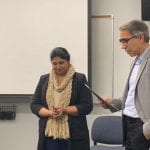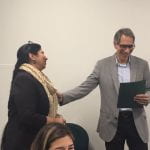Posts under tag: teaching
Bala Wins Tykeson Award for Teaching Excellence

Congratulations to Professor Jagdeep Bala for winning the prestigious Tykeson Teaching Award from the College of Arts and Sciences!
Divisional Dean for the National Sciences Hal Sadofsky surprised Jag by presenting the award to Jag during her Peer Advisors class meeting. All the other CAS deans were in attendance (Ford, Blonigen, Scher, & Wonham), plus Department Head Ulrich Mayr, former Tykeson Teaching Award winner Jordan Pennefather, multiple Psychology Department faculty, some staff members, and the three advising GEs in Psych (Everett, Fridman, and Bedford-Peterson) who work with Jag. Jag’s husband, Avinash, was also able to be there for the surprise.
You can read what Dean Hal Sadofsky said about Bala’s teaching and see pictures below:
[embeddoc url=”https://blogs.uoregon.edu/psychology/files/2020/02/Bala_Award_Tribute.pdf” download=”all” viewer=”google” ]
State of the Department Report, 2019

Our annual State of the Department Report for 2019 summarizes our scholarship, undergraduate education, and graduate education activities for the past academic year. We’ve had a busy year! A brief summary is below, and you can read the full report here.
Psychology’s research and scholarly activity has been very vigorous during the last year. With regard to the most important aspect, namely peer-reviewed journal articles, our department presented 218 publications (i.e., about 6.4 per faculty member) and many of these were in the best, discipline- specific and cross-disciplinary journals. Other indicators, such as grant funding (combined 29 active grants with a total volume of $29 million) and national-level awards to our faculty are consistent with a highly productive department. Aside from a strong emphasis on basic-science research, faculty in our department also often engage in research with direct, societal impact.
In terms of teaching, Psychology continues to be one of the largest and by all metrics, most efficient providers of student credit hours on campus.
In terms of graduate education, Psychology continues to attract highly talented graduate students and we can afford to be highly selective in our admissions (14 admissions out of 438 applicants). At the same time, the department should work on growing our class size by 2-3 students per year, which may require extra recruitment efforts and/or adjustments in our initial interview offers. Our clinical graduate program serves a particularly important function in terms of training research-oriented clinical psychologists and its involvement in the associated Psychology Clinic, which provides both training opportunities and serves the community’s mental health needs.
[embeddoc url=”https://blogs.uoregon.edu/psychology/files/2019/06/SOD-2019-Final-Draft-Combined.pdf” download=”all” viewer=”google” ]
State of the Department Report 2018
We are pleased to share our inaugural State of the Department Report for the 2017-2018 Academic Year. This report was compiled in response to a call from the Provost to set goals and monitor progress, and is an intended to be a frank assessment of our accomplishments for the present year and aspirations for the next. We think we had a pretty good year!
[embeddoc url=”https://blogs.uoregon.edu/psychology/files/2018/10/SODPsychComplete2018-1cq4rgo.pdf” download=”all” viewer=”google” ]
Grad student Rosenthal on confronting rape myths in HuffPo

HUFFPO / WAVEBREAKMEDIA LTD VIA GETTY IMAGES
Marina Rosenthal, a grad student, wrote a great piece in the Huffington Post on confronting rape myths in the classroom with empathy: “I look back at my student and ponder another, perhaps even more compelling explanation for his perspective. What would it mean for him to accept the statistically viable possibility that his close friend really did sexually assault another student?”
Dean of the College of Arts and Sciences W. Andrew Marcus writes: “I just read your powerful narrative in the Huffington Post – and want to thank you for the work you are doing at UO. I was moved by your description and am deeply appreciative of how you are reaching our students to change their understanding and their lives. It is a journey, and one that as teachers, we can never know the end point of. Thank you for keeping at it.”













